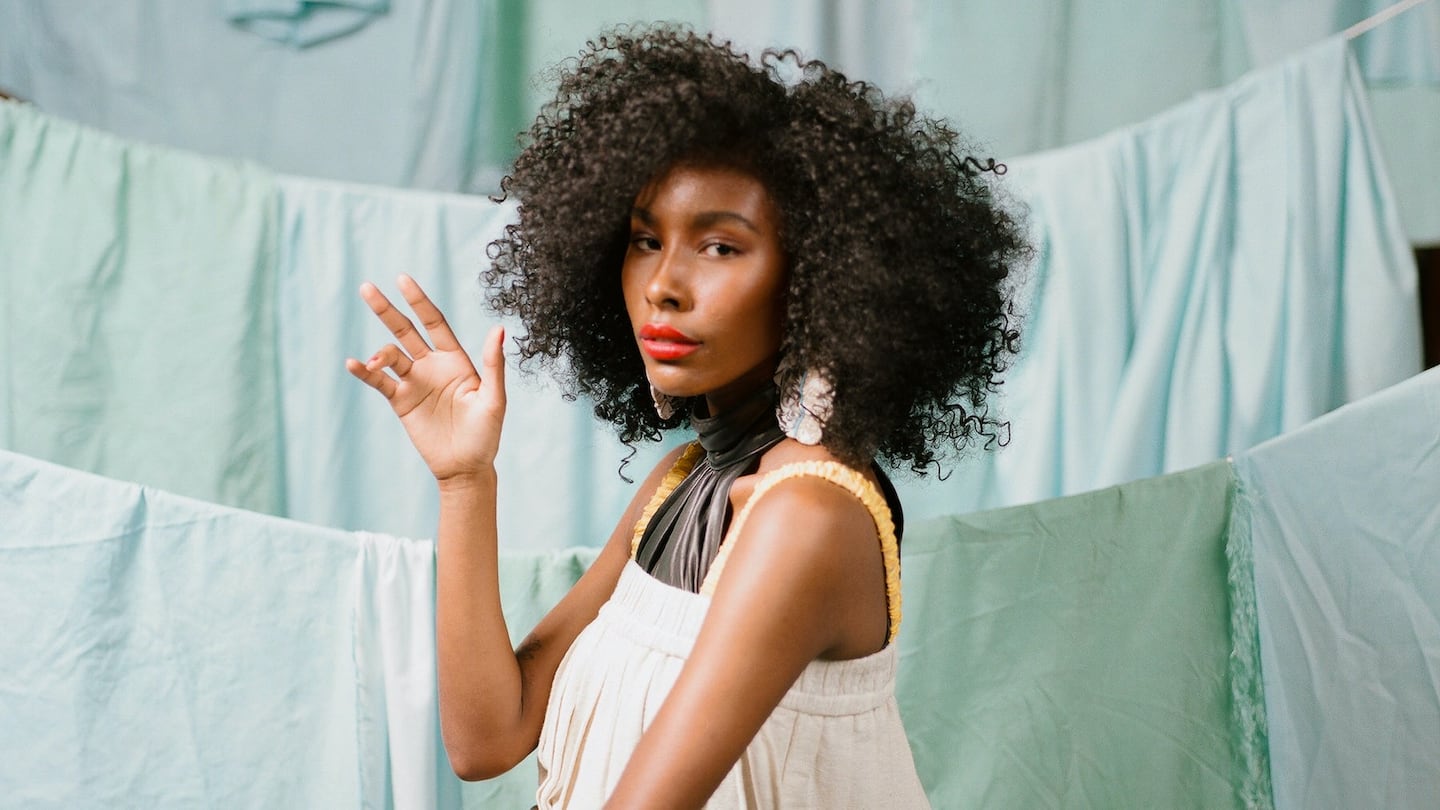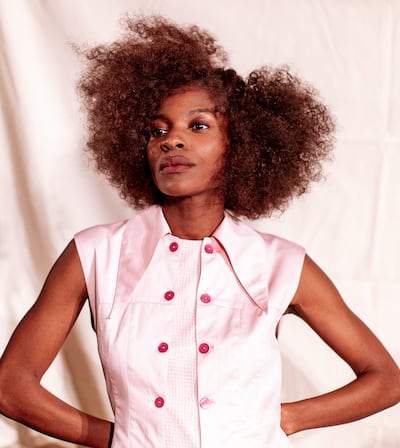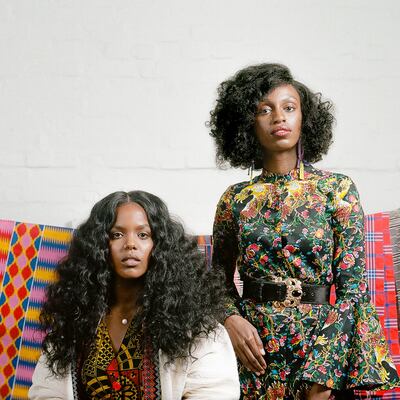
The Business of Fashion
Agenda-setting intelligence, analysis and advice for the global fashion community.

Agenda-setting intelligence, analysis and advice for the global fashion community.

LONDON, United Kingdom — When Freddie Harrel decided to start wearing her hair naturally, the French-born, London-based fashion blogger and digital marketing veteran wanted to find a way to make her hair bigger. Unable to find a solution locally, she did some online research and designed her own easy-to-clip-in extensions, ordering them from a Chinese supplier.
Posting her new look to Instagram, she was soon flooded with comments and DMs from followers who wanted to know the secret to achieving such volume with what appeared to be her natural hair. It was then that Harrel thought about starting her own textured hair extensions beauty brand.
The past two decades have seen a growing number of black women swap at-home chemical relaxers for haircare products that enable them to style and wear their hair naturally. This shift has been largely driven by changing consumer preferences, visibility of natural, textured hair in the media and safety concerns around chemical products.
But as the popularity of non-harmful styling solutions has risen, more women have turned to wigs, extensions and braids. And, with the market for these products impacted by fragmented distribution and a largely offline purchasing experience, this is a multi-billion-dollar arena ripe for disruption.
ADVERTISEMENT
It has also been an opportunity that has remained in the blindspot of a largely white, male pool of investors and haircare industry executives.
“It’s been clear to us that there are no new and modern brands that speak to this consumer, in the way that brands like Glossier have emerged for the Millennial beauty consumer. That leaves a wide, open gap in the market for the modern black woman,” said Nisha Dua, general partner at BBG Ventures, a VC firm that invests in female-founded tech businesses.
With her new beauty brand, Radswan, Harrel is hoping to fill that gap.
There are no new and modern brands that speak to this consumer. That leaves a wide-open gap in the market for the modern black woman.
Radswan is pitching synthetic clip-in textured hair extensions, wigs and accessories to digitally savvy and time-conscious black consumers. (For ethical reasons, Harrel wanted to stay away from using human hair, which can also be much more expensive and harder to maintain.)
Originally, Harrel started selling clip-in extensions under the brand name Big Hair No Care in 2017. The aim was “to offer people a better experience from what we had seen before,” she told BoF. However, overwhelmed by popularity and lacking a robust business infrastructure, she was unable to fulfil orders fast enough, and ceased trading to start building a company full time.
Radswan is part of London-based beauty startup accelerator programme Founders Factory, which is backed by L’Oréal. Ahead of launch, it has raised $2 million in funding from an all-female investor group, led by BBG Ventures and including Female Founders Fund and American entrepreneur and influencer Hannah Bronfman.
The new products will hit market next Spring, shipping globally using a digital-first, direct-to-consumer model. For its launch, the brand will relocate to New York because the market is bigger than in the UK or France, said Harrel.

Radswan founder Freddie Harrel | Source: Courtesy
ADVERTISEMENT
Indeed, African Americans account for 14 percent of the US population, but their spending power is outsized in many packaged consumer goods categories, including beauty, fragrance and toiletries.
Market research company Mintel estimates that African American consumers will spend $1.75 billion on haircare products this year, with styling aids the leading category. But only $782 million of that total is spent with haircare brands that directly target black consumers, opening a strong opportunity for new companies to enter this space.
With sales of damaging chemical relaxers — a hugely popular product among black women in the '80s and '90s — plummeting 40 percent in the United States over the last decade, the popularity of “protective styles” (which includes consumption of products like braids and wigs that don’t require any harmful chemical manipulation of a consumer’s natural hair) is on the rise. Today, 78 percent of all black consumers in the US don’t use chemicals on their hair, according to Mintel research.
“Black consumers are finding new and different ways to wear desired hair styles without manipulating their own hair underneath,” said Toya Mitchell, senior multicultural analyst at Mintel.
It’s hard to accurately estimate the size of the wigs and extensions market, due to an opaque supply chain and fragmented, largely offline distribution network, said Mitchell. But between 2015 and 2019, the use of braids and extensions among black consumers in the US rose 64 percent, while the use of wig hair styles increased 79 percent and weave styles are up 47 percent, Mintel research shows. This has also seen increased spending on haircare regimen products.
Beauty incumbents are leaning into the opportunity, expanding offerings of haircare products targeting black consumers. For example, in November 2017, Unilever acquired Sundial Brands, parent company of SheaMoisture, while this July Procter & Gamble launched its first in-house incubated haircare line specifically catering to black women, My Black is Beautiful.
New players in this space have also been on the rise. Startups like The Mane Choice and Mielle Organics, while only commanding a sliver of market share, are growing fast. Earlier this year, actress Tracee Ellis Ross launched Pattern Beauty, a brand for "curly, coily and tight textured hair."

Radswan will sell clip-in textured hair extensions and wigs | Source: Courtesy
ADVERTISEMENT
“The market is expanding and brands are beginning to think of us from the beginning instead of as an afterthought, but now the next step is seeing more of us in leadership positions that continue to build on representation in the industry,” said Jamé Jackson, fashion and beauty editor and founder of TheBlondeMisfit.com.
To date, investment and innovation in the textured hair care category has largely focused on “wet” hair products, such as shampoos, conditioners and styling products, as opposed to “dry” extensions and wigs.
Synthetic extensions and wig products are often of poor quality and can be time consuming to put on. Typically these products are sold in independent beauty supply stores, with little (or no) online presence. Websites that do sell extensions and wigs can feel clunky and dated.
“My experience with shopping for these self-expression tools was constrained and biased,” Harrel explained in a press statement. “Products are usually sold through retailers lacking an online presence and are managed by those who are unfamiliar with the nuances of buying, styling and caring for the products.”
There’s also an assumption that all black women are hair styling experts, she added. “I know from our community and my personal experiences that this isn’t always the case.”
Harrel saw an opportunity for innovation across product and the retail experience. Employing a digital-first, direct-to-consumer model would allow her to produce higher-quality synthetic hair pieces at an affordable price point. The products would be easy to use and ready to wear straight out of the box, making it accessible to all women regardless of hair styling skills and time constraints. And the shopping experience would be seamless, engaging and convenient, in line with other digital direct-to-consumer brands that have recently flooded the market.
A brand like Harrel's actually has the ability to create connection and emotion with the user from day one. A big brand incumbent can't match that authenticity.
Education is also an important piece of the brand. “The world of hair extensions is built for people who just assume that we have so many [hair styling] skills,” she told BoF. “I had built a product because I was very clueless about hair. ... I realise now my core target is people who don’t know how to get started with wigs.” As a result, the website will also house content for consumers, including video tutorials and articles.
What really stood out for investors was Harrel’s focus on creating a community for the global African diaspora. When developing Radswan, Harrel enlisted her future customers to help shape what the brand would be through pop-up shops, focus groups and social media conversations. And her community was highly engaged: she put out a 37-question survey to her 230,000 Instagram followers, receiving over 1,200 responses with a 93 percent completion rate.
“A brand like [Harrel’s] actually has the ability to create connection and emotion with the user from day one,” said BBG Ventures’ Dua. “This is a brand that speaks to a woman who owns her own identity and is really kind of unapologetic about that. I think that is something that only someone like Freddie Harrel can do. A big brand incumbent can’t match that authenticity.”
Related Articles:
[ Beauty’s Inclusivity Movement Has Sparked a Shade-Matching Arms RaceOpens in new window ]
[ Unpacking the Fenty FrenzyOpens in new window ]
[ Is Luxury Haircare Ripe for Disruption?Opens in new window ]
L'Oréal reported a 9.4 percent rise in first quarter sales on a like-for-like basis on Thursday, beating expectations and easing concerns about a slowdown in the two biggest beauty markets; the United States and China.
The founder, who was ousted and recently came back to the line as CEO, will regain control of the company.
Beauty labels hope to court the concert set for both brand awareness and trendsetting opportunities.
Black founders carry a markedly higher burden when it comes to educating investors on the value and viability of their business ideas — but there is an art and science behind knowing when your brand is ready and what kind of investors will be the best fit.